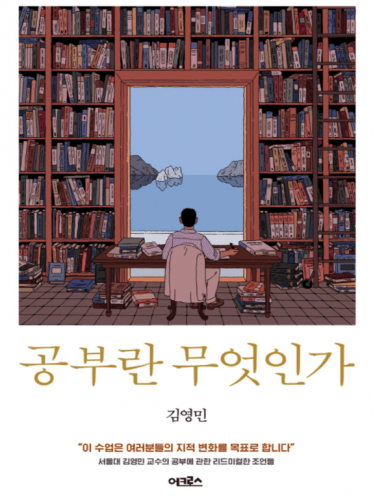June 4, 2021
Engaging with Korean Books Through Booksori
Seyoung Nam
In early October 2020, as an incoming UW graduate student, I attended all kinds of information sessions to better understand my new living environment and the facilities available to students. I was particularly impressed by the UW Libraries, which not only provided online Korean books, but hosted great events like Booksori, in which a reader shares their thoughts on a Korean book with the Korean Studies Librarian, Hyokyoung Yi. A glance at the list of previous guests, mostly professors, professional writers, or literature majors, quelled any thought of participating myself. The bar seemed too high.
In mid-November, halfway through my first quarter, I heard through the Korean Graduate Student Association that Booksori was seeking a student guest for the next session. Putting aside self-doubt, I emailed Hyokyoung. To my delight, she invited me to take part.

Cover of Kongbu ran muŏt in’ga (What is Study?),
by Youngmin KimŎk'ŭrosŭ
The book Hyokyoung asked me to discuss was Kongbu ran muŏt in’ga 공부란 무엇인가 (What is Study?), written by a Seoul National University professor named Youngmin Kim 김영민, and published in Seoul in 2020. The title sounded a little dull, so I was not optimistic. Neither did I relish the prospect of more professorial lecturing. But I remained curious, hoping at least to find some tips on how to succeed as an international graduate student in the US. After all, Kim had earned his PhD (at Harvard) and taught for a period in the US. A scholar of Chinese and Korean intellectual history, he now teaches in SNU’s Department of Political Science and International Relations.
It didn’t take long for me to realize my preconceptions about the book had been wrong. Yes, it is all about study, and is a bit too academic and philosophical. But Kim conveys his ideas with engaging metaphors and humorous stories, making the book far from boring. His perspectives on key issues confronting Korean society are accessibly presented and, more importantly, rooted in logical analysis.
Kim argues that the purpose of study is not to view the world through a simplifying lens, but to embrace its complexities and try to understand these without conflict. He emphasizes “the power of thinking,” and claims Korean students need more of it. I agree with his argument. The Korean education system places importance on understanding proven solutions to a given problem and applying those to similar circumstances. Students are not given time to contemplate why particular solutions are best; they are forced to simply memorize them for exams. I believe the current education system is well suited to producing talent for a society trying to catch up with advanced countries. But as Korea matures in its economic development, it’s time to seek out an education system that encourages students to fully understand basic principles and deduce new ideas through logical thinking.
Interacting with What is Study through a Booksori session with Hyokyoung was certainly more meaningful than just reading it. When reading I often highlight sentences that I like or find meaningful, and jot down impressions afterwards. Such habits are useful for revision, but not for fully appreciating a work and making it “mine.” Preparing for Booksori and exchanging opinions with Hyokyoung helped me absorb more deeply the book’s ideas, decide where I stood on its arguments, and organize it within my mind. In autumn 2020 I took a course called Policy and Ethics in Information Management. In the first week, we learned about the elements of an argument. Afterwards I revisited What is Study?, and found a new appreciation of the writer’s arguments. I realized that what Kim termed “the power of thinking” was essentially deductive reasoning. Without Booksori, I would never have grasped the writer’s true message.
Participating in Booksori inspired me in two ways. First, it led me to deeply engage with a thought-provoking book I might not otherwise have read, let alone appreciated. I hope other students interested in exploring Korean books will take the opportunity to participate. Second, reading an e-book version of Kim’s work, accessed from the platform of Kyobo (Korea’s best-known bookstore), drove home to me what a tremendous effort the UW makes to offer diverse resources for students, including digital materials in foreign languages. What a rich experience!


